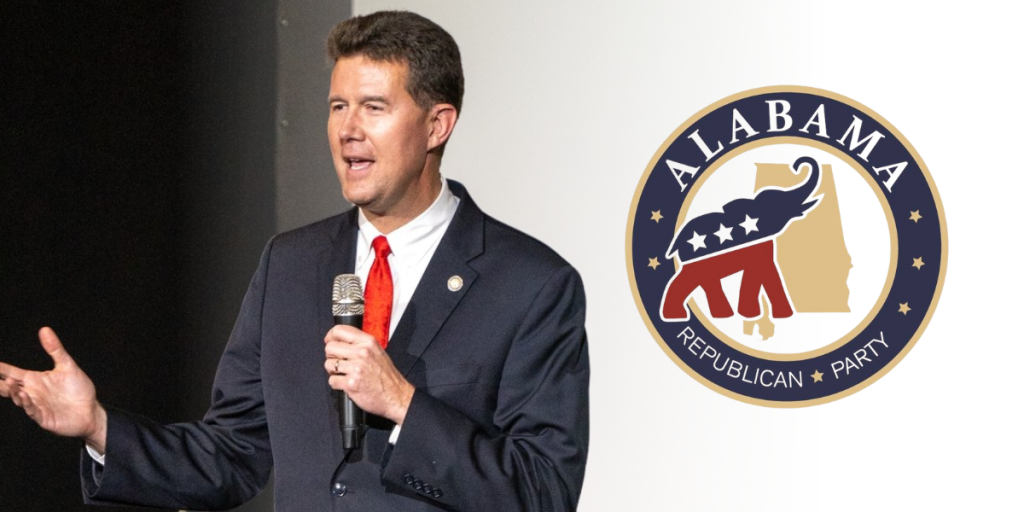Alabama Attorney General Republican nomination candidate Chess Bedsole recently responded to the 2018 Alabama Policy Institute and Yellowhammer News Attorney General Candidate Questionnaire. His responses are below.
ACTING PHILOSOPHY
Interpreting the Law
Question: Attorneys general are in the business of interpreting and enforcing the law. If elected, would you see your role as Attorney General (AG) as that of an activist, with freedom to interpret the law to new situations, events, and presidential administrations, or as that of a constructionist, interpreting the law strictly through the lens of original intent?
Bedsole: Philosophically, I believe that the original intent, or original construction, of laws is paramount in interpreting laws: that laws must be applied as actually written. This belief has most recently been associated with conservative Justices Antonio Scalia, Clarence Thomas and Neil Gorsuch. Accordingly, I have been a member of and worked with the Federalist Society to advance these values off and on for decades — most visibly for both Presidents George W. Bush and Donald Trump. Changing the law is the job of the legislative branch, not the Attorney General. If you want to change laws, you should run for the legislature.
Enforcing the Law
Are you willing to aggressively defend state statutes and policies, even if you disagree with them?
Absolutely. It is the job of every lawyer to advocate for their clients without regard to personal opinions. I will always work to uphold the rule of law. That stated, I firmly believe that some of Alabama’s laws need to be updated. For instance, I strongly believe we can do better at securing schools in Alabama. I will work with the legislature to try to affect improvements to the code, even while defending existing policies.
Balancing Roles
How do you plan to balance your role as chief law enforcement officer in the state with your role as chief legal representative of the state?
In the recent past, the law enforcement role has taken a backseat to the legal and policy roles in the AG’s office, and we are paying the price. In my opinion, more attention was paid to DC and Montgomery legal/policy issues than to our core crime problems. As a result, crime has exploded. Alabama is ranked number 3 among all states for murder, we have violent crime increasing by double-digit rates each year, and drug sales are off the charts, even number one in some categories. Birmingham’s murder rate has almost doubled in 3 years. We have thousands upon thousands of untested rape kits waiting at the lab for analysis. It is critical that we provide local law enforcement with the money, equipment, training, coordination and manpower to really get crime back under control. What we need is leadership — servant leadership. I believe that balance must be restored to the law enforcement and legal roles and that a written plan must be drafted and followed, using crime statistics, to ensure success.
MANAGEMENT
Budget and Staff
The AG oversees a staff of more than 160 and a budget of over $10 million. What has prepared you to lead such a large organization and to be a responsible steward of taxpayer dollars?
I have served in senior management roles in much larger but also smaller operations, with taxpayer dollars. In the 90’s, I started my career serving as legal counsel for conservative firebrand and United States Senator Jesse Helms. I managed a large file of his business, under budget and with success. For years as a private sector lawyer, I served with Treasurer Boozer and others on three Alabama state boards, including the 529 Board, which has grown to manage billions of dollars for college education (and is NOT related to the PACT Board or its problems). Twice in my life, I served as legal counsel for Presidential Transitions (George W. Bush and Trump), managing teams to achieve our goals under deadline and budget. I served with President Trump for almost 2 years total (one of the longest tenures), where the operations under my purview came in under budget every single month and with taxpayer dollars in the end. Lastly, I ran my own criminal court for 5 years, where I earned a reputation for being frugal and implementing policies to save taxpayer dollars.
Prosecutorial Discretion
Given limited resources, the AG must use discretion in deciding which crimes to prosecute. What is your overall position on the extent of prosecutorial discretion? Should prosecutorial discretion ever be used to avoid prosecuting an alleged corrupt government official? Do you think a prosecutor ever has the right to not prosecute a broad range of accused people/crimes?
Simply put, prosecutorial discretion is the power prosecutors have over whether to bring charges, which charges, and also the severity of plea bargains and sentence recommendations. Traditionally, prosecutorial discretion in the US has been almost limitless and without review, for two good reasons: First, prosecutors operate under limited budgets and know what they can afford to pursue. Second, they have the best information to determine the merits of a case and the chances of success.
More recently, liberal outside groups have alleged that prosecutorial discretion has been applied in unfair ways and should be limited. However, they miss the obvious: prosecutorial discretion is already limited, both by ethics rules and also the ballot box. For these reasons, I am not in favor of further limiting prosecutorial discretion. This discretion, without merit, should never be used to justify avoiding a difficult job, such as prosecuting corrupt government officials. I believe in the traditional power and application of prosecutorial discretion, mostly because I know that those who shirk their duty can and often do pay a price, either by a tribunal or a vote of the people.
ETHICS
Code of Ethics
Both the current and the preceding AGs proposed comprehensive reforms to Alabama’s ethics laws. The Legislature recently established a Code of Ethics Clarification and Reform Commission “to reform and clarify the Code of Ethics”. The AG will co-chair this Commission with the Ethics Commission Director. Would you recommend amendments or revisions to the ethics code? If so, what are your suggestions in doing so?
Yes, our ethics laws must be strengthened and clarified. We must also strengthen our laws to ensure those who misuse government resources and use their positions for personal gain are fully penalized. It’s time we start putting the criminals who wear suits every day in the same prisons as everyone else. No ankle bracelets and no country club prisons.
In the Office of Attorney General
While the Alabama Attorney General’s office is one of the state’s largest legal offices, it has been a common practice for AGs to outsource lucrative legal work to politically connected law firms. The firms often then contribute large sums to the AG’s campaigns for reelection or higher office. Is this an example of the AG using the powers of the office for personal benefit? If so, how will you make changes to this practice?
No, it’s an example of the AG using the powers of the office for political benefit, an important distinction. Several decades back, more law firms had the chance to do work for the state. In the recent past, the AG’s office began serving larger chunks of state legal business to fewer and fewer firms, basically picking winners and losers in the legal community. This has led to at least three problems: 1. smaller firms are shut out for no good business reason. 2. Larger law firms could be performing work in cases that might be conflicted. 3. The Attorney General appears bought and paid for, or at least rented. When outsourcing legal work makes sense, I would prefer to open up state contracts to more firms, given they all have the relevant expertise.
Ethics and Economic Development
Alabama House Bill 317 exempts certain economic developers from being required to register as lobbyists and drew heated discussion across the state this past legislative session. Is this exemption, in your opinion, as innocuous as proponents claim or likely to lead to abuse as opponents suggest?
This law continues a pattern of gray area and loopholes within our ethics laws and allows the Montgomery status quo to turn a blind eye to back room deals. Corruption has undermined public trust in our elected officials. We will not clarify our ethics laws and give citizens confidence in our elected leaders while simultaneously passing laws, which take away accountability measures. We need to revisit this legislation and reform our ethics laws in order to turn the page on public corruption.
INDIVIDUAL RIGHTS
Campus Free Speech
U.S. Attorney General Jeff Sessions recently said there is “too much suppression of free and open speech on college campuses today.” Do you believe this is an issue in Alabama and, if so, how should the AG respond?
There is a clear bias against conservative views on college campuses. While college campuses should be a place for free and open debate, there have been multiple documented cases of college administrators acting to silence opinions, which are contrary to their own beliefs. This is unacceptable. As AG, I will support legislation to ensure First Amendment rights on our college campuses. Additionally, I will not hesitate to file suit protecting conservative speech on campus from the liberal snowflakes and haters.
Religious Liberty
Do you think that individuals and small business owners should be forced to participate in activities that violate their religious beliefs in order to comply with anti-discrimination laws?
No. We must protect religious freedom at all cost, including the preservation of Christian values. In the bigger picture, I believe that President Trump will get to appoint at least one more Supreme Court Justice and that we will get the first conservative court in more than 50 years — thank God! The next Alabama AG must be a committed and proven conservative — willing, able and experienced in fighting for conservative causes. Otherwise, we risk losing the best opportunity of our lifetimes to reverse 8 years of Obama regulations and 50-plus years of liberal court decisions. For more than 20 years I have been a champion of conservative causes, fighting alongside U.S. Senator Jesse Helms, Presidents George W. Bush, President Donald Trump. Working to protect our values and preserve freedom. We must not lose this fight.
FEDERAL ISSUES
Federal Overreach
When Texas Governor Greg Abbott was the Lone Star State’s Attorney General, he made headlines by saying, “I go into the office, I sue the federal government, and I go home.” What role should the AG take in fighting federal government overreach? Would you be willing to file suit—and use state resources—to prevent such overreach?
I would use state resources to prevent such overreach because the cost of not filing these suits is far greater to Alabama business and their ability to grow and thrive.
Immigration
Many state attorneys general have sued the Trump administration for ending the Deferred Action for Childhood Arrivals program. On May 2, 2018, Alabama joined six other states suing to end the program permanently. In your opinion, how effective is this form of joint action and how do you plan on upholding Alabama immigration law if executive action on the federal level runs contrary?
These forms of joint action can be very effective. We must put a permanent end to the unconstitutional disaster that is DACA. I will fight to protect our citizens from dangerous illegal immigrants. When I am AG, illegal immigrants will know that if they come to Alabama illegally and commit a crime, they are going behind bars.
Opioid Epidemic
According to the CDC, Alabama is the state highest-prescribed with opioids, with more prescriptions than people. Opioids are the main driver of overdose deaths and, in 2016, 756 Alabamians died from drug overdoses. As AG, how would you address Alabama’s share of this national crisis?
Opioids have ravaged Alabama, and we’ve got to fight both the supply and the demand. On the supply side, we must end doctor-shopping to get multiple prescriptions, prosecute illegal pill-mill practices and provide clear limits for how many doses can be prescribed for minor procedures, without getting in the way of long-term pain care for folks with chronic conditions. We must coordinate with federal law enforcement to arrest multi-state dealers and fight gangs. Regarding opioid demand, we must continue to add drug courts where needed to manage not only caseloads but the rehabilitation of opioid users. Successful rehab often includes churches, families and employers, and we must include them in the process where possible.
RULE OF LAW
Civil Asset Forfeiture
Some states are eliminating provisions that allow police to seize property without securing a criminal conviction. Would you support legislation that reforms the use of civil asset forfeiture by law enforcement and the provision that allows agencies to keep the proceeds of seized property? Why or why not?
I believe civil asset forfeiture is a necessary tool for law enforcement. However, I would support legislation providing more transparency to the process.
Prison Reforms
Alabama has received national attention for the state of its prisons and a federal judge recently called inmate care “horrendously inadequate”. How would you address this issue, and do you support the use of private prisons?
Prison reform is an issue that must be tackled by the legislature. As AG I would advocate for better mental health facilities and the expansion of services for veterans. As a former criminal court judge, I supported law enforcement efforts to fight drug sales and worked with local charities and churches to help victims of domestic violence. I also cut costs to taxpayers by requiring work or school of young, able-bodied, nonviolent offenders. I will continue to support law enforcement in these efforts. However, I will fight against any prison reforms, which will create a revolving door and put criminals back on the streets.
Gaming
In its 2009 Cornerstonedecision, the Alabama Supreme Court held that local laws in Alabama legalizing “bingo” games for the benefit of churches and other charities authorized only the old fashioned, or “traditional” game commonly known by that name. The Court repeated itself over a half dozen times in the seven years after Cornerstone. In light of the Alabama Supreme Court’s decisions on this issue, should casinos—like the ones operating in Macon and Greene Counties—be allowed to operate as they are today? Explain your answer in detail, including whether you consider Alabama Supreme Court decisions on matters of Alabama law to be “the law of the land.”
In 2009, the Governor of Alabama appointed a special task force to enforce the gambling laws of Alabama in the absence of any action by the then Attorney General to shut down or prosecute the operation of gambling machines in Macon, Greene and other counties. This action by the Governor succeeded in shutting down casinos in these counties. Should that enforcement action have been taken by the Attorney General instead of the Governor?
The Indian Gaming Regulatory Act allows certain Indian tribes, including the Poarch Creek, to conduct gaming operations on reservation land if such operations are permitted by the law of the state in which those reservations are located. Numerous Alabama Supreme Court decisions have been written arguing that electronic machines of the nature at issue are illegal under Alabama law. Should these machines continue to be permitted on Indian reservations within the State of Alabama? If elected Alabama Attorney General, would you work with the United States Attorney General to make sure that the all gambling laws, including federal law applicable to Indian reservations, are properly enforced?
The Alabama Supreme Court ruled in favor of Governor Riley and clearly defined gaming laws in our state. I will uphold the laws of our state as defined by the court.
The courts have also clearly outlined the state’s jurisdiction in relation to regulating gaming operations on reservation land. As AG, I will work with Attorney General Jeff Sessions to enforce all federal laws related to gambling in our state.













